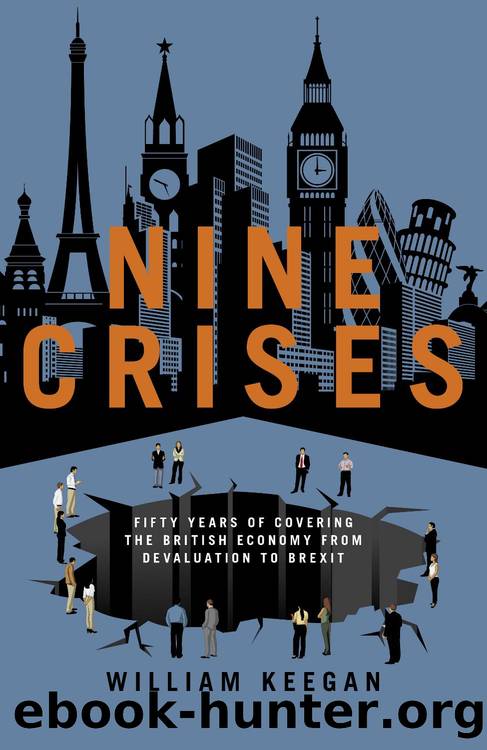Nine Crises by William Keegan

Author:William Keegan [William Keegan]
Language: eng
Format: epub
ISBN: 9781785903939
Publisher: Biteback Publishing
Published: 2019-07-14T16:00:00+00:00
A fortnight later this was augmented by the revelation that ‘the government is now operating economic policy as if the pound were already in the exchange rate mechanism of the European Monetary System. Nigel Lawson would like to put sterling formally into the ERM shortly after a June election…’
I quote this at length because on going back in my files I made an amazing discovery. The above appeared a year before Mrs Thatcher discovered what was going on, and all hell broke loose. But evidently Mrs Thatcher did not read the Observer Business section, and her press secretary did not draw it to her attention. Now, they say memory plays tricks, but I like to think that I have a reasonably good memory. However, my report in March 1987 made so little impact that even I forgot it. Thus when, a year later, a senior official asked me over coffee after lunch whether I had noticed that we were shadowing the D-Mark, my reaction was as follows:
‘Wow! No, I certainly hadn’t. What a story!’
Both Mrs Thatcher and her economic adviser Sir Alan Walters realised now what the Chancellor was really up to, and were hopping mad. The Prime Minister did not like the European exchange rate mechanism partly because it was European and partly because it was an exchange rate mechanism. This was the time when she came out with the much-quoted phrase ‘You can’t buck the market’ – notwithstanding that earlier episode in January 1985 when she had successfully ordered intervention to prevent the pound from falling to $1.
As a consequence of the worst British recession since the Second World War, inflation had come down from a peak of 21 per cent in 1980 under the first Thatcher government to around 3.5 per cent by the time of the 1983 election. After that, it had begun to rise again. It was given added impetus by Nigel Lawson’s tax-cutting budget of 1988. Notwithstanding his damaging flirtation with monetarism, Lawson was at heart an expansionist. By 1988 he was extremely popular, and he will go down in history as the Chancellor who lowered the bar for rates of taxation to a level that even Gordon Brown, years later, was nervous about raising. As we saw in Crisis 4, the top rate had been absurdly high until 1979, when Geoffrey Howe had brought it down to 60 per cent. Lawson’s 1988 Budget reduced it further, to 40 per cent, where it remained for most of New Labour’s stewardship, until the financial crisis. This had an amazing impact on the general attitude towards taxation levels and rather stymied the efforts of those of us who argued that UK tax rates ought to be far closer to Continental levels in order to improve our public services.
Unfortunately for Lawson, however, he has already gone down in history as yet another Chancellor, like Maudling before him, who let a boom get out of control. But his dramatic resignation in autumn 1989 had less to do with
Download
This site does not store any files on its server. We only index and link to content provided by other sites. Please contact the content providers to delete copyright contents if any and email us, we'll remove relevant links or contents immediately.
Hit Refresh by Satya Nadella(9101)
When Breath Becomes Air by Paul Kalanithi(8407)
The Girl Without a Voice by Casey Watson(7865)
A Court of Wings and Ruin by Sarah J. Maas(7778)
Do No Harm Stories of Life, Death and Brain Surgery by Henry Marsh(6921)
Shoe Dog by Phil Knight(5238)
A Higher Loyalty: Truth, Lies, and Leadership by James Comey(4937)
The Rules Do Not Apply by Ariel Levy(4930)
Hunger by Roxane Gay(4908)
Tuesdays with Morrie by Mitch Albom(4750)
Everything Happens for a Reason by Kate Bowler(4717)
The Immortal Life of Henrietta Lacks by Rebecca Skloot(4564)
Millionaire: The Philanderer, Gambler, and Duelist Who Invented Modern Finance by Janet Gleeson(4441)
How to Change Your Mind by Michael Pollan(4334)
All Creatures Great and Small by James Herriot(4293)
The Money Culture by Michael Lewis(4168)
Man and His Symbols by Carl Gustav Jung(4113)
Elon Musk by Ashlee Vance(4105)
Tokyo Vice: An American Reporter on the Police Beat in Japan by Jake Adelstein(3965)
